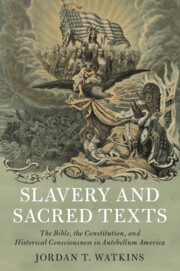 Slavery and Sacred Texts
Slavery and Sacred Texts Published online by Cambridge University Press: 12 June 2021
This chapter shows that biblical criticism encouraged some figures, including Ralph Waldo Emerson and Theodore Parker, to abandon what they perceived as transient historical grounds for what they understood as a transcendent moral sphere. Many scholars have stressed the ahistorical aspects of Transcendental belief and emphasized the ways in which Transcendentalism outgrew its Unitarian roots. In doing so, however, they have often neglected to note how historical arguments freed heterodox thinkers such as Emerson and Parker in their attempts to build atemporal worlds. While most biblical scholars used historical readings to ground universal truths in a biblical past, these Transcendentalists employed historical explication to unmoor such truths from that historical setting. The growing perception of historical distance assisted them in that effort. As these and other thinkers drew attention to the shiftiness of historical evidence, the limitations of time, and the remoteness of the past, they exposed the transience of the historical grounds on which American Protetants based their faith.
To save this book to your Kindle, first ensure no-reply@cambridge.org is added to your Approved Personal Document E-mail List under your Personal Document Settings on the Manage Your Content and Devices page of your Amazon account. Then enter the ‘name’ part of your Kindle email address below. Find out more about saving to your Kindle.
Note you can select to save to either the @free.kindle.com or @kindle.com variations. ‘@free.kindle.com’ emails are free but can only be saved to your device when it is connected to wi-fi. ‘@kindle.com’ emails can be delivered even when you are not connected to wi-fi, but note that service fees apply.
Find out more about the Kindle Personal Document Service.
To save content items to your account, please confirm that you agree to abide by our usage policies. If this is the first time you use this feature, you will be asked to authorise Cambridge Core to connect with your account. Find out more about saving content to Dropbox.
To save content items to your account, please confirm that you agree to abide by our usage policies. If this is the first time you use this feature, you will be asked to authorise Cambridge Core to connect with your account. Find out more about saving content to Google Drive.